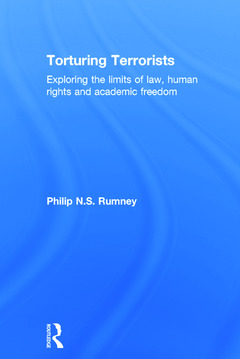Torturing Terrorists Exploring the limits of law, human rights and academic freedom
Auteur : Rumney Philip

This book considers the theoretical, policy and empirical arguments relevant to the debate concerning the legalisation of interrogational torture. Torturing Terrorists examines, as part of a consequentialist analysis, the nature and impact of torture and the implications of its legal regulation on individuals, institutions and wider society. In making an argument against the use of torture, the book engages in a wide ranging interdisciplinary analysis of the arguments and claims that are put forward by the proponents and opponents of legalised torture.
This book examines the ticking bomb hypothetical and explains how the component parts of the hypothetical are expansively interpreted in theory and practice. It also considers the effectiveness of torture in producing ?ticking bomb? and ?infrastructure? intelligence and examines the use of interrogational torture and coercion by state officials in Northern Ireland, Algeria, Israel, and as part of the CIA?s ?High Value Detainee? interrogation programme. As part of an empirical slippery slope argument, this book examines the difficulties in drafting the text of a torture statute; the difficulties of controlling the use of interrogational torture and problems such a law could create for state officials and wider society. Finally, it critically evaluates suggestions that debating the legalisation of torture is dangerous and should be avoided.
The book will be of interest to students and academics of criminology, law, sociology and philosophy, as well as the general reader.
Introduction 1. Torture, Consequences and the Perils of Legalisation 2. The Ticking Bomb Argument: Critical Perspectives 3. Interrogational Torture and the Question of Effectiveness 4. Torture Statutes, Slippery Slopes and the Challenges of Regulation 5. Debating Torture and the Benefits of Dissent Conclusion.
Phillip NS Rumney is professor of criminal justice at Bristol Law School, UWE. He has written a number of articles on the debate over the legalisation of interrogational torture, including a detailed analysis of the effectiveness (or otherwise) of torture as a means of producing accurate and timely intelligence disclosures. He has also authored work that examines the way in which interrogational torture can serve to undermine counter-terrorism strategies by provoking retaliation or hardening the resolve of terrorist groups and their supporters.
Amongst his various research interests Phil engages in research concerning rape and freedom of expression. This work has been cited in various government reports, reviews and Parliamentary debates. He is actively engaged in several empirical and developmental projects concerning sexual violence, including a school-based sexual violence myth busting project; a domestic and sexual violence bystander intervention project; an evaluation of a specialist police rape investigation unit and a study of attitudes towards people charged with serious criminal offences. Outside of work, Phil is a passionate fan of boxing.
Date de parution : 11-2014
15.6x23.4 cm
Disponible chez l'éditeur (délai d'approvisionnement : 14 jours).
Prix indicatif 172,36 €
Ajouter au panierDate de parution : 11-2014
15.6x23.4 cm
Disponible chez l'éditeur (délai d'approvisionnement : 14 jours).
Prix indicatif 58,78 €
Ajouter au panierThèmes de Torturing Terrorists :
Mots-clés :
interrogational; torture; debate; absolute; prohibition; ticking; bomb; Interrogational Torture; cases; CIA Interrogation; CIA Detention; Ticking Bomb Argument; Ticking Bomb Cases; OLC Memo; Torture Debate; Imminent Terrorist Attacks; Ticking Bomb Scenario; Absolute Prohibition; Slippery Slope Argument; Absolute Legal Prohibition; OLC Lawyer; Infrastructure Intelligence; Ticking Bomb; Eta Action; Abu Zubaydah; Torture Works; State Torture; American Morality; Intelligence Gains; Intelligence Disclosures; Unreality Thesis; CIA Employee; CIA’s Counterterrorism Center



